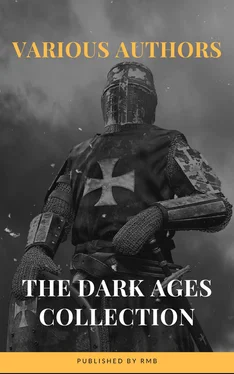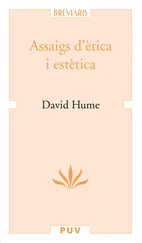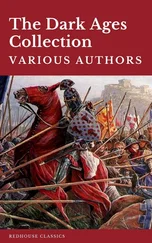Gaïnas, in the meantime, a declared enemy, like Alaric three years before, marched plundering through Thrace. But he won little booty, for the inhabitants had retreated into the strong places which he was unable to take. He marched to the Hellespont, intending to pass over into Asia. But when he reached the coast opposite Abydos he found the Asiatic shore occupied by troops, who were supported by warships. These forces were under the command of Fravitta, a loyal pagan Goth who in the last years of Theodosius had played a considerable part in the politics of his own nation as leader of the philo-Roman party. He had since served under Arcadius, had been promoted to be Master of Soldiers in the east, and had cleared the eastern Mediterranean of pirates from Cilicia to Syria and Palestine. 86The Goths encamped on the shore, but when their provisions were exhausted they resolved to attempt the crossing and constructed rude rafts which they committed to the current. Fravitta’s ships easily sank them, and Gaïnas, who had remained on shore when he saw his troops perishing, hastened northwards, beyond Mount Haemus, even beyond the Danube, expecting to be pursued. Fravitta did not follow him, but he fell into the hands of Uldin, king of the Huns, who cut off his head and sent it as a grateful offering to Arcadius (December 23, A.D. 400). History has no regrets for the fate of this brutal and incompetent barbarian.
It was significant of the situation in the Empire that a Gothic enemy should be discomfited by a Goth. Fravitta enjoyed the honour of a triumph, and was designated consul for A.D. 401. Arcadius granted him the only favour he requested, to be allowed to worship after the fashion of his fathers.
Thus the German danger hanging over the Empire was warded off from the eastern provinces. Stilicho could no longer hope to interfere in eastern affairs through the Goths of the eastern army. The episode was a critical one in Roman history, and its importance was recognised at the time. It was celebrated in two epic poems 87as well as in the myth of Synesius. Scenes from the revolt were represented in sculpture on the pillar of Arcadius which was set up in A.D. 403 in the Forum named after him. 88
The year 400, which witnessed the failure of the German bid for ascendancy at Constantinople, was the year of Stilicho’s first consulship. Claudian celebrated it in a poem which was worthy of a greater subject:
quem populi plausu, procerum quem voce petebas,
adspice, Roma, virum… .
. . . hic est felix bellator ubique defensor Libyae, Rheni pacator et Histri.
The hero’s services to the Empire in war and peace outshine the merits and glories of the most famous figures in old Roman history. The poet himself aspired to be to Stilicho what Ennius had been to Scipio Africanus. Noster Scipiades Stilicho — a strange conjunction of names; but we forgive the poet his hyperboles for his genuine sense of the greatness of Roman history. The consulship of the Vandal general inspired him with the finest verses he ever wrote, a passage which deserves a place among the great passages of Latin literature — the praise of Rome, beginning —
proxime dis consul, tantae qui prospicis urbi
qua nihil in terris complectitur altius aether. 89
He has expressed with memorable eloquence the Imperial ideal of the Roman State:
haec est in gremium victos quae sola recepit
humanumque genus communi nomine fovit
lmatris, non dominae ritu, civesque vocavit
quos domuit nexuque pio longinqua revinxit. 90
The approaching disruption of the Empire was indeed hidden from Claudian and all others at the end of the fourth century. The Empire still reached from the Euphrates to the Clyde. Theodosius, who ruled a larger realm than Augustus, had steered it safely through dangers apparently greater than any which now menaced, and Stilicho was the military successor of Theodosius. The sway of Rome, if the Roman only looked at the external situation, might seem the assured and permanent order of the world:
nec terminus umquam Romanae dicionis erit.
Yet there was a very uneasy feeling in these years that the end of Rome might really be at hand. It was due to superstition. The twelve vultures that appeared to Romulus had in ages past been interpreted to mean that the life of Rome would endure for twelve centuries, and for some reason it was thought that this period was now drawing to a close:
tunc reputant annos interceptoque volatu
vulturis incidunt properatis saecula metis. 91
The ancient auspice seemed to be confirmed by exceptional natural phenomena — the appearance of a huge comet in the spring of A.D. 400 92and three successive eclipses of the moon. Before these signs appeared, Honorius and Stilicho had allowed the altar of Victory which had been removed from the Senate-house by Theodosius to be brought back, a momentary concession to the fears of the Roman pagans. And it is very probably due to superstitious fears that the work of restoring the walls of Rome was now taken in hand. 93
When Stilicho went to Rome to enter upon his consulship, 94Claudian accompanied him, and his verses richly deserved the statue which was erected at the instance of the senate in the Forum of Trajan “to the most glorious of poets,” although (the inscription runs) “his written poems suffice to keep his memory eternal.” 95
§ 5. John Chrysostom
It was during the interlude in which Gaïnas and Typhos were supreme that Eudoxia, who had borne Arcadius two daughters, was crowned Augusta (January 9, A.D. 400). 96Notwithstanding her German descent, she had no sympathies with the German party, though she had independently helped them to compass the fall of Eutropius. It is significant that of the hostages whom Gaïnas had demanded, John was notoriously her favourite and Saturninus was the husband of her intimate friend Castricia. The Empress was a woman of forceful character and impulsive temper, 97and after the eunuch’s fall she won unbounded influence over her weak and sluggish husband. Her historical importance centres in the conflict into which she was drawn with Chrysostom, a drama which was to settle the future relations between the Imperial and the Patriarchal authority. No critical collision had occurred before. With the exception of Valens no Emperor had resided constantly at Constantinople before Arcadius, who never left the capital except for a summer holiday at Ancyra. Moreover, the see had only recently attained to the first rank in the Eastern Empire (A.D. 381), and its primacy was hotly disputed by Alexandria. That the collision between Emperor and Patriarch occurred at this time was due principally to the aggressive and uncompromising character of Chrysostom.
John, the “golden-mouthed” preacher, was in his forty-sixth or forty-seventh year when he became bishop of Constantinople (February 26, A.D. 398). 98He was an independent and austere man, who in his own habits carried asceticism to excess, and his ways were rough and uncourtly. At Constantinople he found himself confronted by a superb court under the sway of Eudoxia. There is no reason to suppose that it was particularly vicious, but it was at least frivolous and embodied for him the pride of life and the pomps and vanities of the world.
Chrysostom stands alone among the great ecclesiastics of the later Empire in that his supreme interest lay not in controversial theology but in practical ethics. His aim was the moral reformation of the world, and as his work lay in two rich cities, Antioch and Constantinople, he conceived it to be one of his chief duties to strive against the flaunting luxury of the rich classes, and denounce the lavish expenditure of wealth on personal gratification, wealth which in his eyes should have been devoted to alleviating the lot of the poor. Thus we learn from his sermons, whether at Constantinople or at Antioch, many details as to the luxurious life of the higher classes. Many rich nobles possessed ten or twenty mansions and as many private baths; a thousand, if not wellnigh two thousand, slaves called them lord, and their halls were thronged with eunuchs, parasites, and retainers. 99In their gorgeous houses doors were of ivory, the ceilings lined with gold, the floors inlaid with mosaics or strewn with rich carpets; the walls of the halls and bedrooms were of marble, and wherever commoner stone was used the surface was beautified with gold plate. Nude statues, to the scandal of strict ecclesiastics, decorated the halls. Spacious verandahs and baths adjoined the houses, which were surrounded by gardens with fountains. The beds were made of ivory or solid silver, or, if on a less expensive scale, of wood plated with silver or gold. Chairs and stools were usually of ivory, and the most homely vessels were often of the most costly metal; the semicircular tables or sigmas, made of gold or silver, were so heavy that two youths could hardly lift one. Oriental cooks were employed; and at banquets the atmosphere was heavy with all the perfumes of the East, while flute girls, whose virtue was as easy as in the old days of Greece and Rome, entertained the feasters.
Читать дальше












